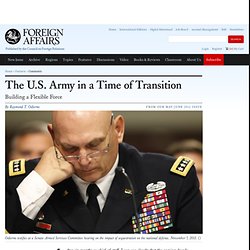

USA - Broken Criminal Justice System. US, China 'Coordinating' on N Korea Policy. On Monday, President Obama met with Hu Jintao, his Chinese counterpart, in Seoul.

According to Deputy National Security Adviser Ben Rhodes, the two leaders agreed to “coordinate” their response to North Korea’s “potential provocation.” And what provocation would that be? In the middle of this month, Pyongyang stated it would launch an “earth observation satellite” sometime between April 12th and 16th. Repositioning the Legions - the USN in 2020. It has been announced by US Secretary of Defence, that by 2020 60% of the USN will be based in the Asia Pacific theatre.

This is a significant shift in posture, and reflects the wider changes occurring to the US military as it orientates itself away from a global posture, and into a more Asian century. Lets consider for a moment what this means – the reality is that by 2020, 60% of the USN, including ‘a majority of’ surface combatants, submarines, and no less than six carrier groups will be based in the Pacific fleet. This is a very substantial shift in resourcing, and reflects this authors long standing view that the US is experiencing its ‘East of Suez’ decade, where increasingly difficult choices have to be made about where resources are applied. In practical terms, as hull numbers drop ever more steadily, and replacements seem interminably delayed, the USN appears on track for an escort fleet of between 70-80 surface ships by 2020.
Whither NATO? Open Door Policy - By Fergus Hanson. Last year, when Internet users in 12 authoritarian states tried to navigate to the social networking sites we take for granted in the West, they encountered the usual government firewall blocking their access.

But there was a twist. Many of them also saw an advertisement alerting them to the fact they could download free tools to circumvent this censorship. Almost half a million users did just that. Foreign Affairs Live: The U.S. Army With Raymond Odierno. Trained in the U.S.A. - By Joshua E. Keating. Country: Mali Training: U.S. military officials have acknowledged that Sanogo "participated in several U.S.

-funded International Military Education and Training (IMET) programs in the United States, including basic officer training," though it's not yet clear which courses he took. Whatever happened to arms control. There's been a lot of needless hoopla over Obama's "open mic" comment at the Nuclear Security Summit, including an almost certainly ghost-written piece by Mitt Romney here at FP.

Obama was overheard telling Russian President Dmitri Medvedev that he "would have more flexibility" to negotiate a deal on missile defense after the election, which is both correct and hardly a state secret. How to Cut the Defense Budget Responsibly. A new era of budget-cutting has begun in Washington, and the Pentagon is in the crosshairs.

Desperate to reduce expenditures anywhere they can, the country's elected leaders are turning to national defense. In 2011, the Pentagon's base budget was $530 billion, plus an additional $159 billion for the wars in Iraq and Afghanistan. Total defense spending is now 73 percent higher than in 2001 in real terms, and it makes up about 20 percent of the federal budget -- a figure exceeded only by Social Security. Last summer's debt ceiling debate and the resulting Budget Control Act have put Congress on a path to cut defense spending by as much as $882 billion over the next decade, according to the Congressional Budget Office. Defense and Democracy in America - Bennett Ramberg. Exit from comment view mode.

Click to hide this space LOS ANGELES – The failure of the US Congressional Joint Committee on Deficit Reduction to reach agreement on budget cuts now sets the stage for $1.2 trillion in automatic reductions to begin in January 2013. Should these cuts go into effect, the US Defense Department, which already must implement $450 billion in reductions over ten years, will take half the hit. But pushback has already begun, with Secretary of Defense Leon Panetta arguing that further reductions will impose “substantial risk” to America’s national security. But, if history is a guide, global events, not deficit hawks or military promoters, will have the ultimate say over how far defense reductions go. While America must, of course, bear any cost to fight a war of survival, throughout history, America’s economic power gave it a broad cushion to pursue wars of choice.
This Week at War: The General's Dystopia - By Robert Haddick. On April 12, Gen.

Martin Dempsey, chairman of the Joint Chiefs of Staff, discussed what he called the "security paradox" at Harvard's Kennedy School of Government. The good news in the world today, according to Dempsey, is that interstate conflict is currently minimal, human violence is at an all-time low, and the United States faces "no obvious existential threat. " Yet Dempsey insisted that "I'm chairman at a time that seems less dangerous but it's actually more dangerous. " Why? Although geopolitical trends are ushering in greater levels of peace and stability worldwide, destructive technologies are available to a wider and more disparate pool of adversaries.... The U.S. Army in a Time of Transition. After six months as chief of staff, I can see clearly that the coming decade will be a vital period of transition for the U.S.

Army. The service will have to adjust to three major changes: declining budgets, due to the country's worsened fiscal situation; a shift in emphasis to the Asia-Pacific region; and a broadening of focus from counterinsurgency, counterterrorism, and training of partners to shaping the strategic environment, preventing the outbreak of dangerous regional conflicts, and improving the army's readiness to respond in force to a range of complex contingencies worldwide. To ensure that declining budgets do not lead to shortfalls in training and equipment, the size of the active-duty force will have to be reduced. The reductions will be painful, but they are necessary and can be done responsibly. Mahan’s Naval Strategy: China Learned It. Will America Forget It? The public debate over the federal budget often obscures the relation between our domestic and foreign interests.

Such debates test democracy’s prudence by forcing a choice between immediate and easily perceptible problems and the distant and often silent strategic interests underpinning policy. An enduring strategy that enables US political and military strength through commercial superiority hinges on naval power. The Uncertain Future of the Military-Industrial Complex - August Cole - International. The U.S. defense industry, flush since September 2001, may once again be facing a period of decline President George W. Bush speaks to employees of United Defense Industries in California in May 2003.
In the background is a Bradley fighting vehicle, made by the company and widely deployed during the initial U.S. -led invasion of Iraq two months earlier / Reuters. Why Panetta's Pentagon Cuts Are Easier Than You Think. This week, Secretary of Defense Leon Panetta is expected to announce a strategy for cutting hundreds of billions of dollars from the defense budget. Civilian and military leaders have reacted with apocalyptic warnings, decrying the disastrous impact such cuts will have. They claim that without proper resources the United States will not be able to protect its interests around the globe.
But the Pentagon does not have a resource problem. As even the Pentagon's strongest supporters agree, it has a management problem. Norbert Ryan, the president of the Military Officers Association, summed it up well in a recent Washington Times op-ed: "Almost weekly we see reports of gross mismanagement and cost overruns in expensive programs, few of which have any relevance to the wars our troops are fighting today," he wrote. Senator John McCain (R-Ariz.), a career naval officer and war hero, went further. Obama's Turn on Nuclear Weapons. When U.S. President Barack Obama took to the podium during a rare visit to the Pentagon early last month, he announced a new strategy for the country's military posture abroad.
The United States would shift from being able to fight two major wars simultaneously to increasing its focus on Asia. How Cutting Pentagon Spending Will Fix U.S. Defense Strategy. The Supercommittee's Worst-Case Scenario - Chris Good - Politics. Caught between the untenable and the unlikable, a dozen members of Congress face the prospect of throwing Washington into chaos As a symbol of government dysfunction, the deficit supercommittee has succeeded gloriously.
Its basic premise, which arose from the summer's debt-limit stalemate, is that President Obama and congressional leaders could only agree on the fact that they could not agree. We can't decide what to do about deficits, they said, so let's make these other guys decide later. As solutions go, it wasn't one. It's easy (and fun!) The Supercommittee and a Never-Ending Cycle of Dysfunction - Michael Hirsh - Politics. Can't anyone in Washington play this game? It may be best, at this point, to simply quote Casey Stengel's infamous yelp of frustration about the 1962 Mets: "Can't anybody here play this game? " If the '62 Mets were the worst team in major league history, it's also fair to wonder whether any Congress has ever been more dysfunctional, with less cause, than this one. And whether there is a single politician left in Washington who can behave like a leader, or even play one on TV. The Military-Political Complex - By James Traub.
The Jet That Ate the Pentagon - By Winslow Wheeler. The Real Defense Budget - Steve Clemons - Politics. Photo credit: Reuters. Time for US Army to Police Itself: Beneath the Surface of the Kandahar Massacre. International - R. Jeffrey Smith - U.S. Military Admits Major Mistakes in Iraq and Afghanistan. A draft military report on a "Decade of War" reveals U.S. armed forces haphazardly entered misunderstood conflict zones and mismanaged manpower. The U.S. Military Is Struggling to Police Itself in Afghanistan - Yochi J. Dreazen - International. My Father’s War Pictures, and Mine. Beyond The Battlefield: Afghanistan's Wounded Struggle With Genital Injuries. Before they went off to fight in Afghanistan, the guys of 3rd Battalion, 5th Marines talked quietly about their deepest fear. Deadwood - By Rajiv Chandrasekaran. When Richard Holbrooke became the Obama administration's Afghanistan point man in January 2009, Summer Coish was keen to join his civilian operation.
Record 45% of Iraq and Afghanistan Vets Have Filed for Disability. Who will get PTSD? - Ideas. How Memorial Day Glosses Over the Real Horrors of War. America's Last Prisoner of War. This Week at War: Does the U.S. Need More Aircraft Carriers? - By Robert Haddick. G.I. Joe - An FP Slideshow. Why Is it Only an "Atrocity" When Other Countries Do It? Inside the World's Largest Embassy. We're Spending More on Nukes Than We Did During the Cold War?! The Future of Afghanistan and U.S. Foreign Policy. Don't Stop at Iraq: Why the U.S. Should Withdraw From the Entire Persian Gulf - Toby C. Jones - International. The Lasting Damage of Iraq - Shlomo Ben-Ami. Sexual assault in the military: Congress pressures Pentagon to fix the system. Leon Panetta Lays Out New Rules to Combat Sexual Assault in U.S. Military. Breaking the Military Family Stereotypes. Politics - Conor Friedersdorf - In Defense of Chris Hayes.